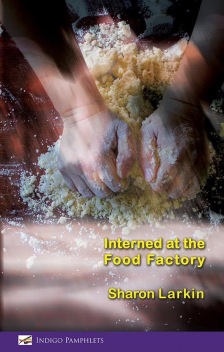Our featured publication for April is Interned at the Food Factory by Sharon Larkin, published by Indigo Dreams Publishing.
Interned at the Food Factory takes eating as its theme, where food is less a source of nourishment and enjoyment, rather a series of individual and social challenges to be confronted and overcome.
“By turns vulnerable and sassy, heartbreaking and funny, consistently insightful and readable. The food in these poems is no spread for some twee picnic. In an age of increasingly innocuous poetry, Sharon Larkin is to be applauded for the rawness included here and for an exceptional instinct for the emotional weight and balance of her poems” Brett Evans
“In these poems Sharon Larkin weaponises the language of food; sometimes witty, always moving. Watch out. This is a place where you must check whether ‘the knife drawer’ [is] closed.” Kate Noakes

Sloe Gin
Plucky to show up so soon
before your white-blousy neighbour
before your green has burst
or frosts have pinched their last
and after they’ve returned
it’s kind of you to hang on,
long after blackberries
are corrupt in devil spit.
How thoughtful of you
to yield the right wood
for this walking stick
bringing bough to hand
but how mean that your
blue-bloomed drupes
so pucker the lips.
You’re only good to ruin gin.
Picker-spiker, now it’s my turn
to pierce your skin, make you bleed.
I take up the needle.
The pay-back is sweet.
A fistful of sugar
for every pound of flesh –
you soak for weeks
in the sticky liquor.
As cakes are laced and puddings sweat,
you are steeping, inedible,
utterly drunk.
Beach Breakfast
It’s been a long night, a difficult week.
We meet on the sand
where you’ve set up an impromptu barbecue –
and, of course, it’s fish you’re grilling,
freshly caught and gutted by the guys
hovering around the boat, looking over at us,
no doubt wondering about the conversation
that is just beginning.
I blurt out how sorry I am.
I was unfaithful. I still love you.
But you don’t seem to accept
my apology, my profession of love.
I have to repeat it, over and over.
You are more concerned about food,
intent on the prospect of sharing it around,
even though in my eyes, right here,
right now, there are just the two of us.
Then I realize that is my perspective.
I’ve squeezed you into my narrow field of view,
where you rightly have the proportions of a giant,
but you’re not mine alone,
you’re theirs over by the boat,
you’re everybody’s.
Pâté d’Alouette
A teenager abroad for the first time
sits down to a little delicacy
from the sixteenth century.
On her plate, bones of a small bird
attracted by multicoloured glass
and netted in the Gatinais,
not a great distance from where
Jeanne d’Arc first ventured out.
She learns the recipe: eight larks,
eight ounces of bloated livers
from force-fed geese, stock
from a boiled chicken, her egg.
Marinate larks in port, thyme, bay.
Next morning, rise with the lark
to prepare the day’s specialité.
Pre-heat your oven to 180 degrees.
Stir-fry the tiny organs and intestines
of your larks, crush them, incorporate
with shallots and breadcrumbs
in chicken stock. Fill body cavities
with truffled foie gras. Make a pastry bed,
bury larks in stuffing. Top off with crust.
Seal. Brush with egg, bake for an hour.
Best served cold with green salad,
a baton, a little wine.
Bacon for the Olfactorily Challenged
Come. I’ll show you the unraw material,
these young Old Spots.
Pick one up. Stroke his back.
Look into his little piggy eyes.
Rub the down across your top lip.
I hope you can sense the tenderness.
Twist his cute curly tail
around your little finger.
Hear him squeal.
Get used to it.
When electrocuted, he’ll sizzle and pop.
Watch as his belly is slit, his innards spilt.
They will glisten and steam,
as they slither over the slick zinc.
It is a shame you can’t smell.
After the beheading, hanging, quartering,
run your fingers over the strips of fat,
lean, gristle, bone. Breathe in the smoke,
the sodium nitrate. They improve texture
and taste but maybe not your health.
Now slice your pig thinly, spread him,
streaky-rashered, over your grill-pan.
Turn up the heat. Hear Babe spit.
Gaze on his remains as they twist and weep.
Wince as his irascible fat stings your hands.
Sprinkle salt on your burns.
Eat your bacon with lashings of sauce.
Previous publication credits: Sloe Gin – Beyond the Well-Mapped Provinces (Cheltenham Poetry Society), Pate d’Alouette – The Stare’s Nest.
Sharon Larkin’s poetry has been widely published in anthologies, magazines and on-line. She is Chair of Cheltenham’s Arts Council and Poetry Society and jointly runs Poetry Café – Refreshed. She was founder/editor of the Good Dadhood poetry project and runs Eithon Bridge Publications.
Interned at the Food Factory is available to purchase from the Indigo Dreams Publishing website.

